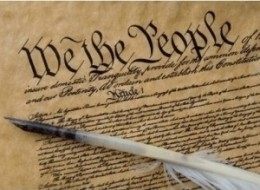
What we are witnessing in American politics today is a debate over national identity and sovereignty that has building for over twenty years. In 2004, during President George W. Bush’s campaign for reelection, Samuel Huntington wrote a book on American immigration and assimilation policy titled Who Are We? In this seminal work on American identity and culture, Huntington wrote about an agenda of “de-nationalization” in which liberal, open-borders advocates call for mass immigration without a cohesive policy to assimilate new immigrants into a distinctly American culture. Everyday Americans reject the de-nationalization agenda of political elites who seek to merge America into a globalist / internationalist cabal of open borders and multiculturalism. The clash between the two factions is now exploding into bitterly divisive politics and protests at airports and on the streets of major cities.
Throughout human history, particularly since the rise of the nation-state concept in the 16th century, it has been assumed that nations would control their borders and set rules and limitations on immigration and assimilation within those borders. While most nation-states in human history have been largely defined by common ancestry and race, America is a nation-state defined by commonly-held ideals, constitutional principles, common language, and a shared concept of human liberty. As such, American immigration policy has not historically been, nor should be, driven primarily by race or ancestry. Instead, American immigration policy has primarily been driven by the willingness of new arrivals to assimilate into American culture, and our national security interests.
Since September 11th, 2001 we have had to carefully balance our commitment to our identity as a nation of immigrants with defense of our distinct national identity and the homeland. Radical Islam poses an existential threat to our nation, both physically and culturally. While our nation does not impose a religious test on citizenship, we are a distinctly Judeo-Christian country. This Judeo-Christian identity is the source of our commitment to individual rights and political liberty, which are the cornerstones of our republic. This identity is something that both animates the animus of radical Islam toward America, and is something that jihadists want to eradicate from our culture. This is achieved, in part, by mass migration into historically Judeo-Christian cultures as we have seen in Europe.
America is welcoming to all people, from anywhere in the world, who want to become part of the American experience. This means, among other things, accepting our nation’s commitment to the Constitution and the rule of law that our constitutional system cultivates. Historically, the largest portion of our new immigrants have arrived from Europe or Latin America, both of which share Judeo-Christian cultural foundations with the United States. Only recently have large numbers of new arrivals begun coming from predominantly Muslim countries, particularly in the Middle East and North Africa. This presents a unique dilemma for our country in terms of assimilation and security. By no means are the majority of Muslims terrorists or radicals, and many love the ideals of American liberty, but there remains a significant cultural chasm between many predominantly Muslim nations and our own.
The Judeo-Christian Ethic is a tolerant worldview that encourages and fosters religious liberty. The fundamentalist Islamic worldview, by contrast, does not provide for religious dissent or differences of doctrine. Additionally, fundamentalist Islam prescribes theocratic government that is inconsistent with American Constitutional law, particularly with regard to religious liberty. A 2013 Pew Forum on Religion and Public Life survey found that more than four in ten Muslims in the Middle East and North Africa hold that Sharia Law should be the “law of the land” for Muslims and non-Muslims alike. This cultural belief certainly stands in contrast with the American notion of equal justice under the law, and is diametrically opposed to a democratic-republican form of government.
Several of the nations in the Middle East, which are sending the largest number of refugees to the United States, are also nations beleaguered by radical Islamist elements that are seeking to carry-out attacks against American targets. As such, it is prudent for the United States to increase screening of individuals seeking asylum / refugee status in our country from these countries. While most individuals even from nations known for terrorism are peaceful and intend no harm, Islamist organizations have long taken advantage of American generosity to infiltrate the American homeland. If even a small percentage of asylum seekers are radical or become radicalized, we will see more attacks like we’ve witnessed in San Bernadino, Orlando, and Boston.
Americans are pushing-back against open borders and the lack of assimilation of many new immigrants from around he world. We are a welcoming nation, which appreciates the uniqueness and value of all cultures, but we also expect new immigrants to weave into the American fabric of one nation out of many. It is incumbent upon all Americans to continue to uphold and maintain our nation’s commitment to being a nation of immigrants, while maintaining our uniquely American identity and commitment to individual liberty. We can be a nation both of secure borders and a color blind society, as sovereignty and acceptance are not mutually exclusive concepts.
Our nation, like every other nation, has a right to determine who comes into our county and on what terms. Fully vetting new immigrants and refugees from nations long known to harbor anti-American sentiment does not make our nation calloused, but it may well make it safer.




